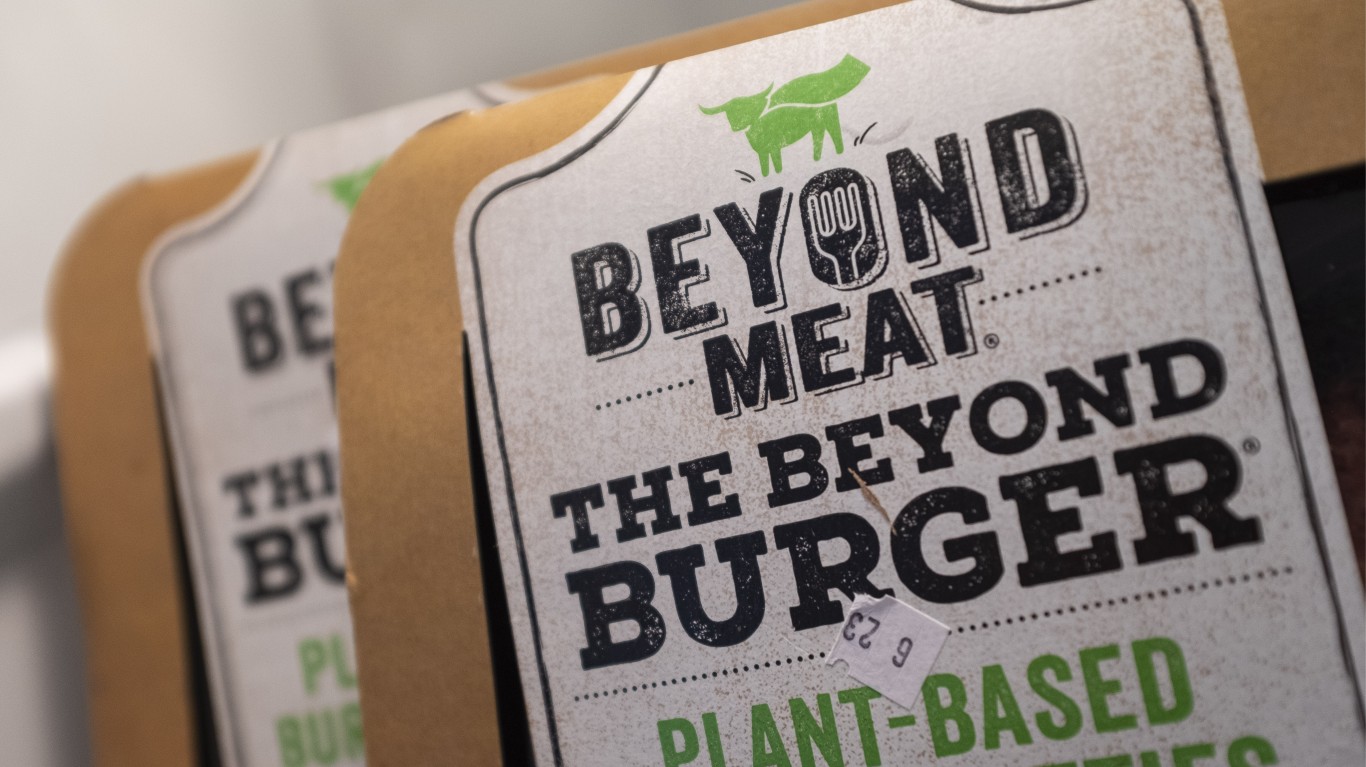Companies and Brands
How America’s Meat Crisis Could Boost Beyond Meat Stock

Published:
Last Updated:

Could coronavirus-related meat shortages help plant-based alternatives, such as Beyond Meat Inc. (NASDAQ: BYND)? The stock is up 72% year to date, compared with the S&P 500, which is down 8.5% for the same period. Beyond Meat closed at $130.03 on Monday.
Meat has been just another supermarket product that’s sometimes been hard to get during the COVID-19 pandemic. After the great toilet paper rush in the early days of the crisis, shoppers have sometimes found shelves missing flour, canned goods, eggs and now meat.
Beyond grocery stores, the meat crunch is impacting restaurants, including the chain famous for its “Where’s the Beef?” TV commercials in the 1980s. Two weeks ago, Wendy’s Co. had to remove its signature fresh-beef burgers at some locations due to the supply chain crunch. A fast-food chain without hamburgers seems downright un-American.
The shortage isn’t caused by lack of animals, experts say. There are plenty of cows and pigs on farms.
The real shortage is in workers who process the meat. Dozens of meat-processing plants around the U.S. have closed due to virus outbreaks. Nearly 900 workers at a Tyson Foods Inc. (NYSE: TSN) pork plant in Louisiana and over 850 workers at a Smithfield Foods Inc. pork facility in South Dakota tested positive for coronavirus.
Those two plants and others have reopened now but are likely producing less meat due to new measures designed to protect workers. Meanwhile, media reports show that meat companies have lost employees due to illness and absenteeism. Some workers may be afraid to reenter plants where the virus ran rampant.
Nationwide, over 4,900 workers at meat and poultry processing facilities have been diagnosed with the coronavirus, including 20 who died, according to the Associated Press. “The illnesses occurred among 130,000 workers at 115 facilities in 19 states, according to the CDC. Some states didn’t provide data, so the actual count is believed to be higher.”
A Washington Post investigation found that Tyson, Smithfield and JBS USA (the three major meat producers) failed to provide protective gear to workers weeks after federal guidelines were issued. The companies defended their actions, saying they’ve taken new steps to ensure employee safety and to return production to normal.
But what does any of this have to do with faux meat? Well, these meat substitutes might be appealing (or at least grudgingly acceptable) if ground beef and pork chops are missing from the store shelves.
Even if real meat is available, stores are limiting purchases in an attempt to head off panic buying. America’s largest grocer, Kroger Co. (NYSE: KR), is limiting customers to two pork and two chicken items at some locations. “Additionally, we are asking our customers to shop responsibly and purchase what they need, knowing that we will continue to replenish stores daily,” a Kroger spokesperson told Supermarket News. Costco (NASDAQ: COST) members are currently only allowed to buy three items from the beef, pork and chicken categories.
Also remember that consumers are eating at home a lot more often since restaurants have been closed or only open for delivery and pick up. Giant Eagle, a chain based in Pittsburgh, told Supermarket News that it was limiting meat purchases not because of supply but because demand is up sharply. “To discourage bulk purchasing and ensure that we have product available for as many guests as possible, we are temporarily limiting the number of ground beef and advertised meat products guests can purchase at once,” the company said.
Whether its supply or demand, all of these forces are pushing prices up. As April ended, supermarket meat sales were up 41% year over year, according to Nielsen. Thus, grocers have less incentive to offer meat specials, and there may be less selection than consumers normally want.
Meanwhile, meat alternatives from companies like Beyond Meat and privately held Impossible Foods are gaining more shelf space at supermarkets. The Impossible Burger just rolled out at over 1,700 Kroger stores. “The rollout of Impossible Burger at Kroger represents an 18-fold increase in Impossible Foods’ retail footprint so far in 2020,” Supermarket News reported.
In a report last fall, Nielsen found that more consumers are trying plant-based products. The research firm found that among consumers interested in the meat industry’s impact on climate change, 61% said they would reduce their meat consumption.
Nielsen suggests companies like Beyond Meat need to do a better job of telling this story to green shoppers. The company also suggests plant-based firms need to better educate consumers on why their products are healthy and safe.
While a number of food manufacturers are rolling out new meat alternatives, Beyond Meat is the only solo equity play right now. CNBC’s Jim Cramer recently said plant-based meat is a trend investors shouldn’t ignore. And Beyond Meat isn’t just an American story; the company sees potential growth in China and elsewhere.
Wall Street remains mixed on the stock, with seven analysts rating it a Sell, nine a Hold and five a Buy. The average stock price target is $93.69.
If you’re one of the over 4 Million Americans set to retire this year, you may want to pay attention.
Finding a financial advisor who puts your interest first can be the difference between a rich retirement and barely getting by, and today it’s easier than ever. SmartAsset’s free tool matches you with up to three fiduciary financial advisors that serve your area in minutes. Each advisor has been carefully vetted, and must act in your best interests. Start your search now.
Don’t waste another minute; get started right here and help your retirement dreams become a retirement reality.
Thank you for reading! Have some feedback for us?
Contact the 24/7 Wall St. editorial team.